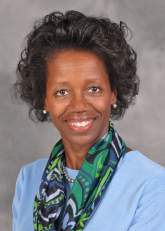
Sharon A. Brangman, MD
Professor of Medicine
Division Chief, Geriatrics
SUNY Upstate Medical University
VJ Periyakoil, MD
Director,
Stanford Successful Aging Program
Clinical Associate Professor
Stanford University School of Medicine
While each person is unique and wonderful, no two bodies are the same—and no two people will age in identical ways. That’s one of the joys, and also one of the challenges, in caring for older adults.
Geriatrics, the healthcare field specialized in caring for older people, has given us great knowledge about the health issues commonly seen in older adults and guides how to provide high-quality care to aging Americans. Even so, we also know that there will be twists, turns, and uncharted destinations along every person’s journey toward healthy aging. However, if older adults work in partnership with their healthcare team and family, life with quality is an attainable goal for all. In fact, that’s one of the critical life lessons we can take away from National Minority Health Month this April.
What is National Minority Month?
National Minority Health Month helps raise awareness for disparities in health and care among specific groups of people known as minorities. Minority groups like American Indians, Alaska Natives, Asian Americans, African Americans, Hispanics/Latinos, Native Hawaiians, and Pacific Islanders account for more than 35% of the U.S. population. Health and care aren’t completely different from one of these groups to the next, but minority health experiences do help highlight how certain conditions, concerns, and challenges may impact some of us differently than others. That’s an important distinction—so important, in fact, that an entire field of geriatrics known as “ethnogeriatrics” has developed around ways to provide culturally competent care to older adults from diverse ethnic and racial backgrounds.
Ethnogeriatrics is about finding important intersections between ethnicity, aging, and health to provide high-quality care. A perfect example of this type of work is a new tool that the American Geriatrics Society (AGS) developed with AARP to help a specific group of older adults who are Chinese Americans better understand and drive their own well-being.
“Chinese American Older Adults: A Guide to Managing Your Health”
This free resource highlights the most common health concerns in the Chinese American older adult community and ways that patients and caregivers can talk to healthcare providers about addressing them.
Health concerns like hepatitis B, certain types of cancer, depression, tuberculosis, cardiovascular disease, diabetes, and some genetic diseases are common among Chinese Americans. Many of these conditions require not only expert care but also sensitivity to cultural norms that can help or hinder care depending on how they are addressed.
Based on expert-authored guidance from healthcare professionals who care for older Chinese Americans, the AGS guide offers simple, practical recommendations addressing these types of issues and opportunities head-on. These include suggestions for talking to healthcare providers about sensitive subjects like:
- Traditional medicines and remedies. These options can reflect important aspects of cultural identity, but they may interact poorly with certain medications and can be adjusted to suit personal preferences and needs.
- Empowering family members and friends to make healthcare decisions. Different minority groups may have different expectations of the involvement of family members in making healthcare decisions.
- Speaking with someone about fears of mistreatment or physical, financial, and emotional abuse.
You may not be Chinese American and you may not be a member of a minority group, but that doesn’t change how important it is to stay informed about your personal well-being, especially as you age. Engaging with HealthinAging.org is a great first step toward this goal, since this portal endorsed by expert geriatricians can give you excellent information about your health concerns and practical ways to address them. It’s also important that you stay connected to the care professionals who know you—and your health—best. Geriatricians, nurses, pharmacists, and other providers are knowledgeable about the types of health problems you may face not only because of age or race, but also because of personal health and lifestyle choices.
Ultimately, ethnogeriatrics isn’t about being different. Rather, it’s about supporting who we are, what we need, and how we age as individuals—a joy and a challenge certainly worth remembering even after National Minority Health Month comes to a close! So, please stay connected with HealthinAging.org; we look forward to partnering with you to ensure that you receive the best care possible.
About the Authors
Drs. Brangman and Periyakoil are the co-editors of Doorway Thoughts, 2nd edition, upon which the “Chinese American Older Adults: A Guide to Managing Your Health” was based.
